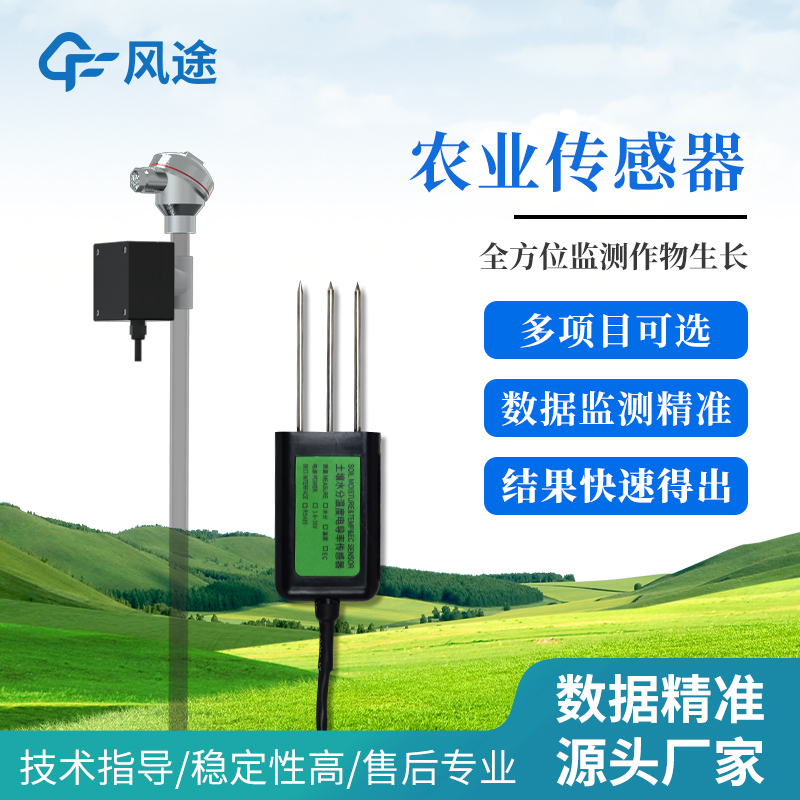Shandong Fengtu IOT Technology Co., Ltd
Sales Manager:Ms. Emily Wang
Cel,Whatsapp,Wechat:+86 15898932201
Email:info@fengtutec.com
Add:No. 155 Optoelectronic Industry Accelerator, Gaoxin District, Weifang, Shandong, China

Sales Manager:Ms. Emily Wang
Cel,Whatsapp,Wechat:+86 15898932201
Email:info@fengtutec.com
Add:No. 155 Optoelectronic Industry Accelerator, Gaoxin District, Weifang, Shandong, China
time:2024-06-14 08:39:54 source:Weather Station viewed:607 time
With rapid industrialisation and urbanisation, there is a growing concern about crop yields and health. Online monitoring of the soil environment is crucial for improving agricultural yields and ensuring the safety of agricultural products.
So there are compact, well sealed soil monitoring sensors on the market, these sensors can be buried in the soil for a long time, rapid response and efficient transmission of soil temperature, humidity and other data, to provide reliable data support for soil management and protection, to help achieve sustainable development of agriculture.
Now let's take a look at what are the soil sensors.
1. Soil temperature and humidity sensor
●The ability to continuously measure soil temperature in real time provides data support for key growth stages such as seed germination, root development, microbial activity and nutrient uptake, helping to improve crop growth rates and nutrient utilisation efficiency.
● By accurately measuring soil moisture, the soil moisture sensor provides a scientific basis for irrigation. Timely and appropriate irrigation can prevent hypoxia and disease caused by high soil moisture or crop growth restriction caused by low moisture, ensuring healthy crop growth while effectively saving water.
2. Soil conductivity sensor
Assessing the salt content of soil by measuring the conductivity of the soil solution plays an important role in determining soil salinity and salt accumulation problems. It not only helps farmers and agricultural experts to understand the health of the soil, but also guides irrigation and fertilisation strategies to avoid high soil salinity affecting crop growth. With this data, measures can be taken to improve the soil and promote crop growth under optimal conditions, increasing the efficiency and sustainability of agricultural production.
3. Soil PH Sensor
Monitoring the pH of the soil is essential for assessing soil health. Real-time monitoring of soil PH can help determine if the soil is contaminated and take appropriate measures to restore soil health. With soil PH sensors, farmers can adjust soil pH to meet the growing needs of different crops, optimise fertiliser use, and improve crop yield and quality. Meanwhile, continuous monitoring of soil pH helps to maintain the stability of soil structure and ecosystem, and safeguard the long-term fertility of the soil.
4. Soil Nitrogen, Phosphorus and Potassium Sensor
Real-time measurements of nitrogen, phosphorus and potassium levels in the soil are essential to ensure that plants receive the nutrients they need, increase crop yields and maintain agricultural sustainability. With this data, farmers can implement more precise fertilisation strategies to ensure soil nutrient balance, while reducing environmental pollution caused by excessive fertiliser use and promoting resource conservation and ecological protection. Such monitoring not only improves agricultural productivity, but also helps crops grow healthier while contributing to environmental protection.
5. Soil All-in-One Sensor
The Integrated Soil Sensor is an easy-to-install device that accurately measures key parameters such as temperature, humidity and salinity of the soil. It is suitable for a variety of agricultural and environmental monitoring scenarios, helping to improve irrigation efficiency, optimise crop management and support sustainable agricultural practices.
The widespread use of soil sensors marks a major step forward in agricultural technology. They provide farmers and researchers with the ability to gain a deeper understanding of soil conditions to guide more precise planting and irrigation practices. As technology continues to advance, these sensors will further enhance the intelligence and sustainability of agricultural production, helping us build a more efficient and environmentally friendly agro-ecosystem.

green house monitors are used to monitor the light, carbon dioxide, temperature, and humidity of the greenhouse, and assist in remote monitoring and control of the greenhouse....
meaning of rain gauge is a device for measuring rainfall, a meteorological instrument for measuring the amount of precipitation per unit area in a given time....
environmental sensor can monitor the environment of negative oxygen ions, pm2.5, pm10, temperature, humidity, air pressure, oxygen content, noise, wind speed, wind direction and other parameters....
In the soil and water loss monitoring of runoff fields and small watersheds, traditional manual measurement of flow and sediment data suffers from huge workload, low efficiency, high labor costs, and large data errors. After years of technological research and a large number of field tests, the Soil...